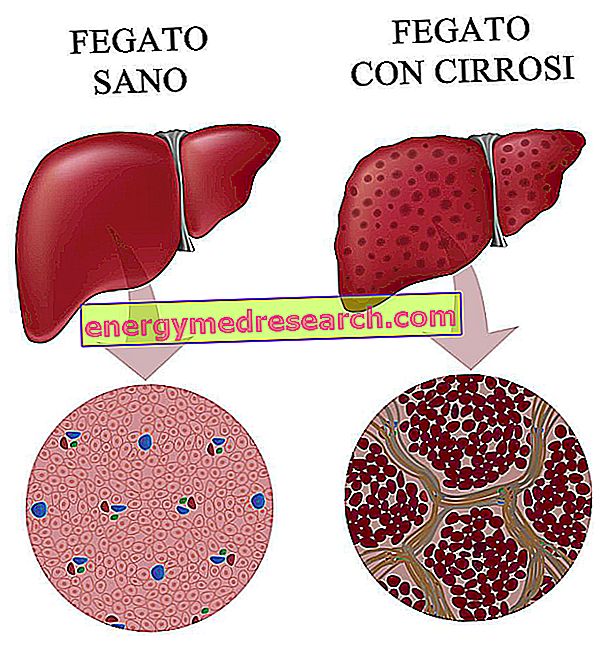Sorafenib is an anticancer medicine that can inhibit tumor growth. It is marketed under the name Nexavar®.
Indications
For what it uses
The use of sorafenib is indicated for the treatment of:
- Late-stage liver cancer (hepatocellular carcinoma);
- Advanced renal cancer (advanced renal cell carcinoma);
- Renal cancer in advanced stage when the standard therapy has not given positive results;
- Differentiated thyroid carcinoma.

Sorafenib - Chemical Structure
Warnings
Sorafenib can cause skin reactions, especially in the hands and feet. In the event of these symptoms appearing, it is necessary to seek medical attention, as treatment may need to be stopped.
Because sorafenib can cause high blood pressure, it is necessary to monitor blood pressure. In some cases, drug treatment may also be necessary.
Sorafenib may increase the risk of bleeding, therefore caution should be used when administering the drug in patients suffering from coagulation disorders.
Since sorafenib can slow down wound healing, in patients who need to undergo surgery, treatment may be suspended.
In the event of chest pain or heart problems, your doctor may decide to stop treatment. In any case, sorafenib should be used with caution in patients suffering from cardiovascular diseases.
In patients with liver disease, the side effects induced by sorafenib may worsen.
Patients on sorafenib with reduced kidney function should be constantly monitored.
Interactions
Concomitant administration of sorafenib and capecitabine, irinotecan, doxorubicin, paclitaxel or docetaxel (other anticancer medicines) can cause their activity to increase and their side effects to worsen.
Neomycin, rifampicin and other types of antibiotics may decrease the therapeutic efficacy of sorafenib.
Concomitant administration of sorafenib with warfarin or fenprocomone (anticoagulant drugs) increases the risk of bleeding.
Other drugs that can interact with sorafenib causing harmful effects are:
- St. John's wort (or St. John's wort), a plant that has antidepressant properties;
- Phenytoin, carbamazepine and phenobarbital, drugs used in the treatment of epilepsy;
- Dexamethasone, a corticosteroid;
- Digoxin, a drug used to increase the strength of cardiac contraction.
Side effects
Sorafenib can cause various types of side effects although not all patients experience them. This depends on the sensitivity that each individual has towards the drug. Therefore, it is said that the adverse effects do not all occur with the same intensity in each patient.
Below are the main side effects that may occur during sorafenib therapy.
Gastrointestinal disorders
Treatment with sorafenib may cause nausea, vomiting and diarrhea.
Nausea and vomiting usually occur in mild form and can be kept under control by the use of anti-emetic (antivomit) drugs.
Diarrhea, on the other hand, can occur both in mild and severe form. If it occurs in mild form, it can be kept under control by the use of antidiarrheal drugs. If, on the other hand, he is in severe form, treatment interruption may be necessary. In any case, it is good to drink a lot in order to replenish lost fluids.
In addition, the drug can cause heartburn, gastritis, pancreatitis, gastrointestinal perforation, constipation and dyspepsia.
Reduced blood cell production
Sorafenib therapy may cause a decrease in blood cell production. This reduction may cause:
- Anemia (reduced amount of hemoglobin in the blood);
- Leukopenia (reduced number of white blood cells) with consequent increased susceptibility to contraction of infections, even serious ones;
- Plateletopenia (reduced number of platelets) with increased risk of bleeding and bleeding.
Hepatobiliary disorders
Treatment with sorafenib may cause inflammation of the gallbladder and / or bile ducts, jaundice and drug hepatitis.
Renal disorders
Sorafenib therapy can cause kidney failure and nephrotic syndrome (a syndrome characterized by kidney damage that causes the loss of large amounts of protein from the urine).
Skin and subcutaneous tissue disorders
Sorafenib therapy can cause alopecia, acne, dry skin, itching, inflammation and peeling of the skin, thickening of the outer layer of the skin (hyperkeratosis), eczema, rash, actinic-like dermatitis in areas of the skin previously exposed to radiotherapy and folliculitis (inflammation of the hair follicles).
More severe skin reactions may also occur, such as Stevens-Johnson syndrome (a more severe variant of polymorphic erythema) and toxic epidermal necrolysis.
Finally, sorafenib can promote the development of skin cancers, such as cutaneous squamous cell carcinoma.
Cardiovascular disorders
Treatment with sorafenib may cause heart failure, prolongation of the QT interval (the interval of time required for ventricular myocardium to depolarize and repolarize), myocardial infarction and leukocytoclastic vasculitis (an inflammation of the small blood vessels that can occur with skin lesions ).
Furthermore, the drug can promote the appearance of hypertension.
Hand-foot syndrome
Sorafenib can cause hand-foot syndrome, which is a syndrome characterized by swelling, redness, pain in the palms and / or the soles of the feet. In some cases, blisters may also occur.
Endocrine disorders
Sorafenib therapy can induce both hypothyroidism and hyperthyroidism.
Nervous system disorders
Treatment with sorafenib may cause headache, fatigue, asthenia and peripheral sensory neuropathy.
Other side effects
Other side effects that may arise following treatment with sorafenib are:
- Allergic reactions in sensitive subjects which can also be serious;
- Hot flashes;
- Reversible edema in the back of the brain;
- Temperature;
- Flu-like symptoms;
- A runny nose;
- Infections;
- Pain in the mouth and tongue;
- Abdominal pain;
- Bone pain;
- Rhabdomyolysis, that is the rupture of skeletal muscle cells which causes the release of substances contained in the musculature into the bloodstream;
- Muscle spasms;
- arthralgia;
- Alterations of the voice;
- Alterations in the sense of taste;
- Dehydration;
- Difficulty swallowing;
- Body weight loss;
- Anorexia;
- Hypocalcemia, hypokalemia and hyponatremia, respectively, decreased blood levels of calcium, potassium and sodium;
- Tinnitus, ie an auditory disorder characterized by the perception of tinkling, rustling, whistling, buzzing, etc .;
- Impotence;
- Gynecomastia (abnormal development of the breasts in men).
Overdose
If you suspect you have taken an overdose of medication, you must contact a doctor immediately. Symptoms that may appear following an overdose consist of an exacerbation of side effects, in particular, you may see a worsening of diarrhea and adverse effects on the skin.
Action mechanism
Sorafenib is an anticancer agent that performs its function by inhibiting particular enzymes called kinases.
Kinases are a large family of proteins involved in many cellular processes.
Sorafenib has selectivity towards particular kinases that are hyper-expressed on the membrane or inside tumor cells and are involved in their growth. In particular, sorafenib - inhibiting these enzymes - is able to:
- Slow down the growth of cancer cells;
- Block the supply of blood to the tumor mass that is, therefore, devoid of nourishment and - consequently - is no longer able to grow.
Mode of Use - Posology
Sorafenib is available for oral administration as tablets.
The tablets should be swallowed whole with the help of a glass of water, away from meals or in the presence of low-fat foods. If sorafenib is taken in conjunction with very fatty foods, in fact, its therapeutic efficacy may be reduced.
Finally, it is important to take the drug at the same time every day, in order to keep the plasma concentration constant.
The dosage of sorafenib should be established by your doctor.
However, the usual recommended dose of sorafenib is two tablets containing 200 mg of active ingredient to be taken twice a day, for a total of 800 mg of drug per day.
Pregnancy and breastfeeding
Sorafenib should not be used by pregnant women. Furthermore, precautions must be taken to prevent pregnancy, both during treatment with the drug and for a certain period of time from the end of the drug. Generally, pregnancies are not recommended for a period of at least five years after the end of therapy.
Since sorafenib can cause damage to the growth and development of the baby, breastfeeding mothers should not take the medicine.
Contraindications
The use of sorafenib is contraindicated in the following cases:
- Known hypersensitivity to sorafenib;
- Pregnant;
- During breastfeeding.



